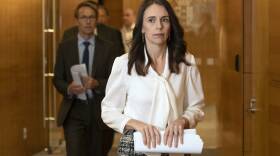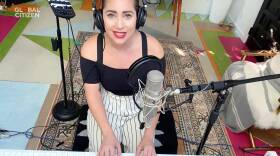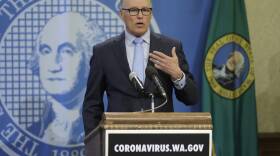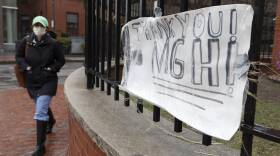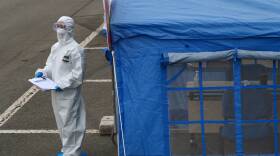EXPLORE MORE
Coming up Monday on BPR:
Mas GOP chair Amy Carnevale and Mass Dems chair Steve Kerrigan
Ali Noorani of the Barr Foundation
Princeton’s Khalil Gibran Muhammad
Recent segments
-
Matt Segal: 35,000 Dismissals Relating To Drug Lab Scandals Revealed 'Hard Proof' That The War On Drugs Can End Without 'Mayhem In The Streets'
A new documentary highlights the civil rights issues at the center of the drug lab scandals, and the broader war on drugs. -
Charlie Sennott On The 'Heroic Streak' Of Women In The Time Of Coronavirus
The GroundTruth CEO commended the work of female leaders and healthcare workers abroad and at home. -
Bob Thompson Reviews 'One World: Together At Home' Simulcast
The simulcast provided some of the best entertainment in the age of coronavirus, Thompson said. -
Director Miles O'Brien Talks New Frontline Documentary 'Coronavirus Pandemic'
The new documentary looks at the different political response rates to the coronavirus pandemic. -
Dr. Vanessa Kerry On COVID-19 In Massachusetts
The state's hospitals have done well to prepare for the surge, but the national response has been mired by politics. -
Emily Rooney On The Origins Of The New Coronavirus Outbreak
Almost as soon as word of a new coronavirus outbreak that first infected people in China reached the internet, conspiracy theories about its origin spread quickly.
Listen to previous shows
-

BPR Full Show 11/2/20: Final Forecasts
Today on Boston Public Radio: Washington Week moderator Robert Costa talked about his special report for the program, about the attitudes of Penn. voters ahead of Tuesday’s election, and how they have and haven't changed in the four years since 2016. We opened lines to talk with listeners about your anxieties and hopes ahead of Tuesday’s election. Charlie Chieppo and Shannon O’Brien joined for a politics roundtable, weighing in on where both of the candidates stands on the eve of Election Day. Chieppo is principal of Chieppo Strategies, a senior fellow at the Pioneer Institute, and Adjunct professor at Suffolk University. O’Brien is former state treasurer and Democratic nominee for governor of Mass. Rep. Ayanna Pressley called in as a surrogate for the Biden/Harris ticket, to make her final appeal to voters ahead of Tuesday’s election. She also weighed in on Mass. police reform, and why she believes the U.S. is due for a third Reconstruction. Charles Stewart III talked about the varying outcomes of Tuesday’s election, and how the surge of mail-in voting and other coronavirus precautions might impact when we get election results. Stewart is the Kenan Sahin distinguished professor of political science at MIT. He’s also director of the MIT Election Data and Science Lab, co-director of the Caltech/MIT Voting Technology Project, and co-director of the Stanford-MIT Healthy Elections Project. Irene Monroe and Emmett Price, hosts of GBH’s All Rev’d Up, talked about the latest headlines at the intersect of religion and Tuesday’s election. We closed out the show by returning to listeners to talk about anything and everything related to Tuesday’s presidential election. -

BPR Full Show 10/30/20: Terms & Conditions
Today on Boston Public Radio: We opened lines to talk with listeners about the idea of a one-term presidency, and whether you think it might benefit America's political system. Pine Street Inn President Lyndia Downey talked about work being done at the Pine Street Inn to empower Boston's homeless residents to vote, and how her organization is preparing for Thanksgiving during the pandemic. Corey Lewandowski, a senior advisor for President Trump’s reelection campaign, talked about how he's feeling ahead of next Tuesday’s presidential election, and why he doesn’t believe in the constitutionality of a nationwide mask mandate. He also rebuked criticisms of President Trump’s refusal to address the QAnon conspiracy theory. Salem Mayor Kim Driscoll talked about the experience of leading her city through Halloween season during the coronavirus pandemic, and discussed what’s being done to keep Witch City residents safe – and tourists at bay. Beat the Press host Emily Rooney reflected on the passing of Travis Roy, a former hockey player-turned activist and motivational speaker. She also discussed news of the unmasked "anonymous" Trump staffer, and read a pre-election list of fixations and fulminations. Under the Radar host Callie Crossley talked about the perforce of moderator Kristen Welker at the last presidential debate, and specifically her handling of questions about race and “the talk” that nonwhite parents have with their children in the U.S. She also touched on how grocery chain Trader Joe's has managed to weather economic storm of the pandemic, and previewed Sunday’s episode of Under the Radar. We closed the show by opening our lines to talk with listeners about the shows, movies, and music you’re taking in to offset the unease of this pre-election moment. -

BPR Full Show 10/29/20: Bernie & Warren Weigh In
Today on Boston Public Radio: NBC “Meet the Press” moderator Chuck Todd checked in to talk about the state of the presidential race, five days away from Election Day. Sen. Bernie Sanders called in as a surrogate for former Vice President Joe Biden, talking about why he hopes supporters of his presidential campaign will pivot to supporting the Democratic nominee. He also weighed in on the confirmation of Justice Amy Coney Barrett to the Supreme Court, and reflected on how much he’s missed in-person rallies. Next, we opened our lines to talk with progressive listeners about their thoughts on Joe Biden’s candidacy. Bill McKibben reflected on the future of the climate crisis, with a possible reelection win for President Trump on Tuesday, and this week’s confirmation of Justice Amy Coney Barrett to the Supreme Court. McKibben is a founder of the climate campaign 350.org, and the Schumann Distinguished Scholar in environmental studies at Middlebury College. He writes "The Climate Crisis," The New Yorker's newsletter on the environment. Former Suffolk County sheriff and secretary of public safety Andrea Cabral talked about Gov. Charlie Baker's nomination of Associate Justice Kimberly Budd to succeed the late Justice Ralph Gants as chief justice of the Mass. Supreme Judicial Court, and reflected on the Philadelphia police killing of Walter Wallace Jr. Next, we opened lines to ask: is all politics personal? Sen. Elizabeth Warren talked about the future of Roe v. Wade in the wake of Amy Coney Barrett’s confirmation to the U.S. Supreme Court, and why she’s optimistic about the notion of building "back better," and the future of the country under a Joe Biden presidency. -

BPR Full Show 10/28/20: Heated!
Today on Boston Public Radio: We opened lines to ask: are the high early voting turnout numbers easing your election day jitters? Joan Donovan, Research Director of the Shorenstein Center on Media, Politics and Public Policy, talked about the rise of the QAnon conspiracy theory, and how media manipulation has allowed it to spread so effectively. CNN analyst Juliette Kayyem discussed rising cases of COVID-19 throughout the U.S., and explained why she’s reassured by the deployment of National Guard troops to cities throughout Texas ahead of the election. M.I.T. economist Jon Gruber talked about the ways varying election outcomes could impact the future of the Affordable Care Act, and responded to questions from listeners. We opened lines for our seasonal inquiry, asking: with temperatures expected to drop below 30 degrees this week, how cold does it need to get before you activate your heat? Writer and naturalist Sy Montgomery returned for our monthly edition of “Afternoon Zoo,” where she talked about the different ways groups of animals pick their pack leaders, and the reasons why certain animals will occasionally social distance. -

Sy Montgomery: Social Distancing In The Animal World
Naturalist Sy Montgomery spoke with Boston Public Radio on Wednesday about how other animal species practice social distancing when signs of disease show in their communities. “When something is off, that might draw predators to your group, so you want to get away from the one who’s going to attract the shark or hyena,” she said. “If someone has a contagious disease, you want to get you and your family away from that disease, so a lot of animals will isolate.” This behavior isn’t true of all animal species however, Montgomery noted. “Elephants, for example, will stay by a sick or dying animal and not leave their side, and dogs are the same, they’ve been known to stay by their master’s graveside.” Montgomery is a journalist, naturalist and a BPR contributor. Her latest book is "Condor Comeback."


